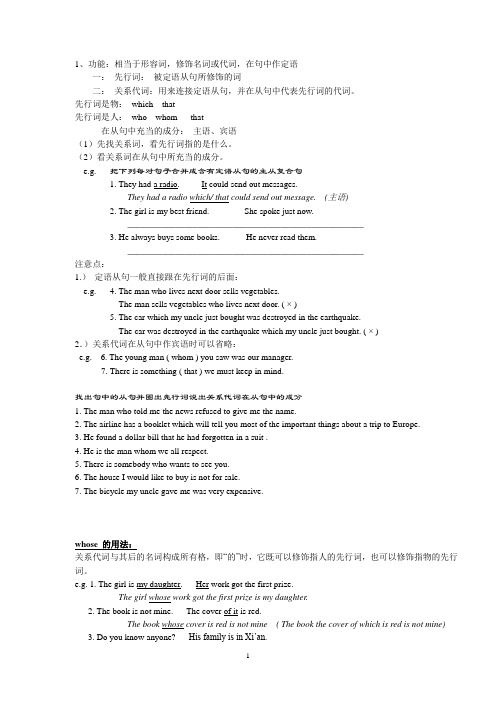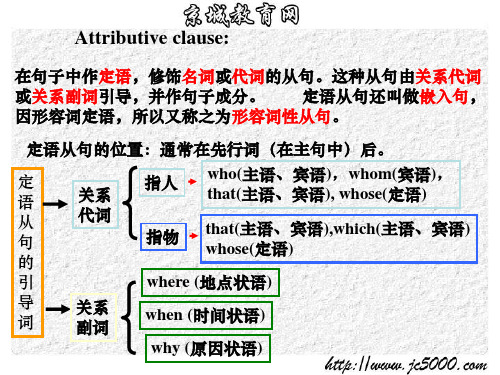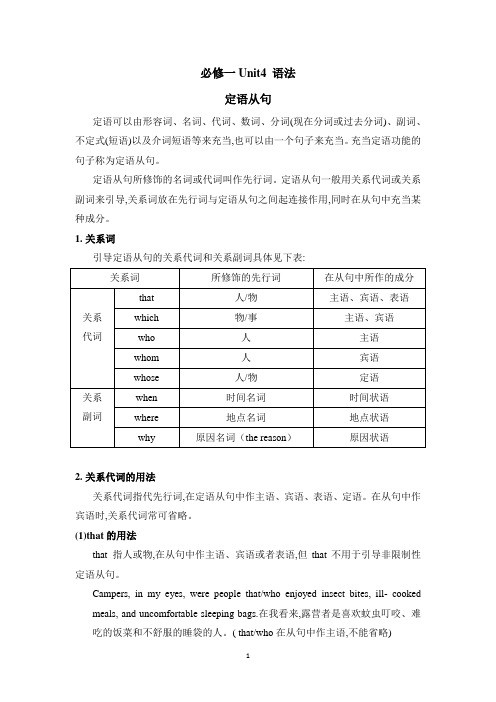高一英语必修一定语从句
高一英语必修一定语从句汇总

1、功能:相当于形容词,修饰名词或代词,在句中作定语一:先行词:被定语从句所修饰的词二:关系代词:用来连接定语从句,并在从句中代表先行词的代词。
先行词是物:which that先行词是人:who whom that在从句中充当的成分:主语、宾语(1)先找关系词,看先行词指的是什么。
(2)看关系词在从句中所充当的成分。
e.g. 把下列每对句子合并成含有定语从句的主从复合句1. They had a radio. It could send out messages.They had a radio which/ that could send out message. (主语)2. The girl is my best friend. She spoke just now.______________________________________________________3. He always buys some books. He never read them.______________________________________________________注意点:1.)定语从句一般直接跟在先行词的后面:e.g. 4. The man who lives next door sells vegetables.The man sells vegetables who lives next door. ( × )5. The car which my uncle just bought was destroyed in the earthquake.The car was destroyed in the earthquake which my uncle just bought. ( × )2.)关系代词在从句中作宾语时可以省略:e.g. 6. The young man ( whom ) you saw was our manager.7. There is something ( that ) we must keep in mind.找出句中的从句并圈出先行词说出关系代词在从句中的成分1. The man who told me the news refused to give me the name.2. The airline has a booklet which will tell you most of the important things about a trip to Europe.3. He found a dollar bill that he had forgotten in a suit .4. He is the man whom we all respect.5. There is somebody who wants to see you.6. The house I would like to buy is not for sale.7. The bicycle my uncle gave me was very expensive.whose 的用法:关系代词与其后的名词构成所有格,即“的”时,它既可以修饰指人的先行词,也可以修饰指物的先行词。
高一英语必修一Unit定语从句

五.whose作定__语___【成分】!!所表属____关系!! 译“为它_的_/_它__的_/_它__的_”__!!!!用来代替His_/h_e_r_/t_h_e_ir_/it.s whose指人也指物!! 指物时 = o_f_w_h_ic_h__ 指人时 = _o_f_w_h_o_m__
This recorder 【which】 he is using is made in
Japan.
这个它正在使用的录音机是日本产的??
四. that 指人/物!!作主语或宾语 【作宾语可省略】
A plane is a machine. It can fly. A plane is a machine that can fly.
I’ve read all the books 【that】 you gave me.
考点:that和which的选择
三先行词是序数词或形容词最高级修饰时??
T这hi是s is我the看be过st b的ook最【好th的at】一I’本ve 书eve?r re?ad. T这hi是s is它the用fir英st c文om写po的sitio第n 【一th篇at】作h文e h?as?written in English.
Here arewthwosoep指ic电tu影re的s!t!h作at定a语re taken from the film . This is the film wwhhoosm指e nmaanm和ewiosmaTni!ta!n作ic宾.语
The man and the woman whom you see in the picture are Jack and Lucy . Jack anwdhoL指uchyeraor和e htehreoihneer!o!作an主d语the heroine who loved each other very much in the film .
高一必修一语法定语从句中关系代词和关系副词使用的区别

where/in which Kunming is a beautiful place _____________ ( flowers are seen all the year round). on which/when I will never forgot the day _____________ I first met you on the ship.
关系副词 where
This is the house (which/that ) he used to live in. This is the house in which / where he used to live.
I know of a place (which /that ) we can swim in. I know of a place in which / where we can
3. 根据先行词与介词的搭配习惯,请体会: e.g. 1949 was the year in which the P.R.C. was founded.
考点四:关系代词前介词的确定
4. Whose从句可转换为“ of +关系代词”型,如: e.g. They live in a house, whose door opens to the south.
找准定语从句的先行词。 定语从句必须有先行词,否则就不是定语从句。 误:Is this farm we visited last week? 该句中定语从句就缺少先行词,将句子还原为陈述句: This farm is ________ we visited last week. 显然应加上the one作先行词。 正:Is this farm the one we visited last week? 当然,这句话改为下面这种形式也是正确的: Is this the farm we visited last week?
高一英语(牛津译林版)必修一定语从句1

精心整理定语从句一、基本概念1.定语从句:在一个主从复合句中修饰某一个名词、代词或修饰整个主句的从句叫定语从句。
换句话说,定语从句就是用来作定语的句子。
23.4512.使用关系代词时应注意的几个问题:a.在以下几种情况下只使用that不用which。
1.。
Array2.3.4.5.在1.Whoistheboythathelpedyou?2.Whichisthebook(that)youboughtyesterday?6.若有两个定语从句,一个用which引导,另一个须用that引导。
Heboughtabookwhichcouldgivehimknowledgeandthatcouldhelptokillthetime.7.当先行词在定语从句中作表语时。
Maryisnolongerthegirl(that)sheusedtobe.b.在以下几种情况下只使用which不用that。
1.引导非限制性定语从句时。
Ihavelostmypen,whichIlikeverymuch.(which作宾语,指代主句中的pen) NewconceptEnglish isintendedforforeignstudents,whichisknowntoallofus.2.3.c.1.2.3.AnewteacherwillcometomorrowwhowillteachyouGerman.4.在以therebe开头的句子中,多用who。
Thereisastrangerwhowantstoseeourheadmaster.5.若有两个定语从句,其中一个关系代词是that,另一个须用who。
Thestudentwhowaspraisedatthemeetingisthemonitorthatstudiesveryhard.HehastoworkonSundays,whichhedoesn’tlike.Hewaslate,whichmadetheteacherangry.Thebridgeisreallywonderful,as(is)showninthepicture.Theexperimentisveryimportant,asindeeditis.e.thesame…as…和thesame…that…的不同。
高中英语人教必修一Unit1-5定语从句整理

Unit 1-5定语从句整理Unit 1:1.Do you want a friend whom you could tell everything to (=to whom you could tell everything)?2.There was a time when a deep blue sky, the song of the birds, moonlight and flowers could never have kept me spellbound.3. It was the first time in a year and a half that (=when) I had seen the night face to face.4. I am only able to look at nature through dirty curtains hanging (=which hang)before very dusty windows.Unit 2:1. At first the English spoken(=which was spoken)in England was very different from the English spoken today.2. English became less like German because those who ruled (=ruling)England spoke first Danish and later French.3. Today the number of people learning (=who learn) English in China is increasing rapidly.4. Many people believe the English spoken (=which is spoken) on TV and the radio is standard English.5. Those who reported (=reporting) the news were expected to speak excellent English.6. However, on TV and the radio you will hear differences in the way(that/ in which) people speak.7. Some people who live (=living) in the mountains of the eastern USA speak with an older kind of English dialect.8. The USA is a large country in which (=where) many different dialects are spoken.Unit 3:1. They are Dai and grew up in western Yunnan Province near the Lancang River, the Chinese part of the river that is called (=called) the Mekong River in other countries.2. We found a large atlas with good maps that showed (=showing) details of world geography.3. It makes wide bends or meanders through low valleys to the plains where (=in which) rice grows.4. Along the way children dressed (=who were dressed) in long wool coats stopped to look at us.5. We will reach Dali in Yunnan Province soon, where (=in which) our cousins will join us.Unit 4:1. It was a night (that/ when/ at which)the earth didn’t sleep.2. But the one million people of the city, who thought little of these events, were asleep as usual that night.3. It was felt in Beijing, which (=and it) is more than two hundred kilometers away.4. A huge crack that (=which) was eight kilometres long and thirty metres wide cut across houses, roads and canals.5. The number of people who were killed or seriously injured reached more than 400,000.6. Later that afternoon, another big quake which (=that)was almost as strong as the first one shook Tangshan.7. The army organized teams to dig out those who were trapped and to bury the dead.8. Workers built shelters for survivors whose homes had been destroyed.9. Your speech was heard by a group of five judges, all of whom (=and all of them) agreed that it was the best one this year.10. Next month the city will open a new park to honour those who died in the terrible disaster.11. The park will also honour those who helped the survivors.12. As you know (=As is known), this is the day(that/when/on which) the quake happened eight years ago.Unit 5:1. The time when (=that) I first met Nelson Mandela was a very difficult period of my life.2. Mandela was the black lawyer to whom I went for advice (=whom I went to for advice).3. He was generous with his time, for which I was grateful (=which I was grateful for).4. The school where (=in which) I studied for only two years was three kilometres away.5. However, this was a time when one had got to have a passbook to live in Johannesburg.6. The day when (=that/ on which) Nelson Mandela helped me was one of my happiest.7. Until today we have reached a stage where (=in which) we have almost no rights at all.8. The parts of town in which (=where) they had to live were decided by white people.9. The places outside the towns where (=in which) they were sent to live were the poorest parts of South Africa.10. We were put into a position in which (=where) we had either to accept we were less important, or fight the government.11. We first broke the law in a way which (=that) was peaceful.12. It was a prison from which no one escaped (=which no one escaped from).13. Mr Mandela began a school for those of us who had little learning.14. He taught us during the lunch breaks and the evenings when (=that)we should have been asleep.15. We read books under our blankets and used anything (that) we could find to make candles to see the words.16. I felt bad the first time (that/ when) I talked to a group.17. I remembered the beatings and the cruelty of the guards and my friends who had died.。
2019新人教版高中英语必修一Unit4 语法 定语从句

必修一Unit4 语法定语从句定语可以由形容词、名词、代词、数词、分词(现在分词或过去分词)、副词、不定式(短语)以及介词短语等来充当,也可以由一个句子来充当。
充当定语功能的句子称为定语从句。
定语从句所修饰的名词或代词叫作先行词。
定语从句一般用关系代词或关系副词来引导,关系词放在先行词与定语从句之间起连接作用,同时在从句中充当某种成分。
1.关系词引导定语从句的关系代词和关系副词具体见下表:2.关系代词的用法关系代词指代先行词,在定语从句中作主语、宾语、表语、定语。
在从句中作宾语时,关系代词常可省略。
(1)that的用法that 指人或物,在从句中作主语、宾语或者表语,但that不用于引导非限制性定语从句。
Campers, in my eyes, were people that/who enjoyed insect bites, ill- cooked meals, and uncomfortable sleeping bags.在我看来,露营者是喜欢蚊虫叮咬、难吃的饭菜和不舒服的睡袋的人。
( that/who在从句中作主语,不能省略)John is no longer the person ( that/who/whom) I knew five years ago.约翰不再是我五年前认识的那个约翰了。
(that/who/whom在从句中作宾语,可以省略) When the time came to make the final decision for a course , I decided to apply for the one that/which reflected my interest.到了最后决定修一门课程的时候,我决定申请那门能反映我兴趣的课程。
(that/which在从句中作主语,不能省略) The city is no longer the one ( that ) it used to be.这座城市不再是它原来的样子了。
人教版高中英语必修一Unit4 的语法(定语从句)说课课件(共24张PPT)
Part four:Homework.(具有承上启下的作用,有助于下节课学习)
1.Remember the table
2. show you a writing with attributive
clauses. (提前老师把复印好的writing范文发给学生下去)
3. finish your own writing with attributive
Which boy is my son?
My son
Jack
裤子是白色的男孩是我儿子。 The boy whose trousers are white is my son.
The boy the trousers of whom are white is my son.
关系代词的实质
Join the following sentences: A plane is a machine. The machine can fly.
groups.
只用that的情况
•当先行词是all, few,none, some,little, •everything, •anything, •nothing ,或 被every, any, all, some, no, little, few, much •等词修饰时
•当先行词被 序数词或形 容词最高级, 以及极端词
人,物
that
whose
物: which
关系代词:人或物,充当主,宾,定
指代 在从句 功能 中的作用
指代人
指代物
主语
who/that which/that
宾语
whom / which/that
who/that
定语
whose
【语法】高一英语 必修一 定语从句专项练习题定语
【语法】高一英语必修一定语从句专项练习题定语从句专项练习题Exercise 1: 默写定语从句的相关知识点定语的基本感念:定语在句中位置:定语的表现形式:从句的基本概念:定语从句:先行词:引导词:关系词的作用:关系代词:关系副词:????????Exercise 2: 指出下列句子中的定语由什么担当,并说明与修饰词的位置关系。
The black bike is mine. 形容词black 作名词bike的前置定语What’s your name?I have 5 books.There is a sleeping boy in our classroom.They made paper flowers.The boy in the room is Jack.I have something to do.It is a swimming pool.There is something wrong.The lesson which we studied yesterday was hard to understand.This is the girl whom I met in the street.Exercise 3: 指出下列句子中关系词的三个作用1. He is the man whom I met yesterday.他是我昨天在街道上遇见的那个人。
关系代词whom,引导后面的定语从句,代替先行词the man在定语从句I met ( ) yesterday.中作met的宾语。
2.I know the man who lives next door.我认识住在隔壁的那个人。
3.She will never forget the day when she got married. 她永远不会忘记她结婚的这一天。
4.He showed me the article that he had written.他把他写的文章拿给我看。
高一英语必修一、必修二【北师大版】语法汇总.doc
高一英语必修一、二【北师大版】语法汇总定语从句1.定语从句的结构及理解2.定语从句的关系词的使用3.定语从句的简化表达知识总结归纳(一)定语从句的结构:在复合句中,修饰某个名词或代词的句子(做这个名词或代词的定语)叫定语从句,定语从句一般放在被修饰的名词或代词后面,被修饰的名词或代词叫做定语从句的先行词,它与定语从句之间要有一个词连接,这个词指代先行词的内容叫做关系词(关系代词或关系副词:tha t, which, who, whose, when, where, why)。
先行词在定语从句中充当主语,宾语,时间,地点,原因状语。
结构:先行词+关系词+定语从句。
1. There she saw a wa l l o f wa te r t ha t was qu ick ly advanc ing towards her.2.In Japan,someone who sees another pe rson mak ing the ges tu r e wi l l th ink i t means m oney.3. A theme park i s a co l l ec t ion o f r ides,exh ib i t ions o r o ther a t t rac t i ons tha t a re based on a com mon theme.4. The park has a conserva t ion cen te r tha t he lps pro tec t mar ine animals and the i rhabi ta t s in the r i vers and coas ta l waters o f As ia.5. Vis i to r s can go on exc i t ing r ides where they can fee l wha t i t i s l ike to do the th ings they have seen t he i r he roes do in t he movie.6. Oprah Winf rey i s a b lack wo m an whose r i se to fame i s an insp i r ing s to ry.(二)定语从句分为限定性定语从句和非限定性定语从句:限定性定语从句:从句对先行词进行必要的描述或说明,缺少它,则句义显得不完整,从句与先行词紧密相连。
人教版英语必修一Unit 1_定语从句_同步课件_共26张PPT_
I love my school which/that is in Zhu Hai .
遥远的东方有一条河它的名字就叫黄河。
In the east there is a river _w_h__o_se_ name is
Yellow River.
物
定语
村里有个姑娘叫小芳长得好看又善良。
There is a beautiful and kind girl 人
The boy whom/that/who we like is Rao
Zhenyang.
宾语
Have a try
The boys come from class 3.
They are working in the
field.
合并句子
The boys who/that are working in the field Come from class 3.
Enjoy a beautiful song and fill the blanks.
Attrtihb定aut语tiv从e C句lauses
you met that
that
5. Do you like the song whose name is SHE?
who, whom, which, that, whose
3. Harry is the boy w__h_o_s_e mother is our math teacher . (+5)
4. God helps those who help themselves.
(+10)
天助自助者。
5. He who laughs last laughs best. (+10)
- 1、下载文档前请自行甄别文档内容的完整性,平台不提供额外的编辑、内容补充、找答案等附加服务。
- 2、"仅部分预览"的文档,不可在线预览部分如存在完整性等问题,可反馈申请退款(可完整预览的文档不适用该条件!)。
- 3、如文档侵犯您的权益,请联系客服反馈,我们会尽快为您处理(人工客服工作时间:9:00-18:30)。
定语从句一、基本概念1.定语从句:在一个主从复合句中修饰某一个名词、代词或修饰整个主句的从句叫定语从句。
换句话说,定语从句就是用来作定语的句子。
2.先行词:被定语从句修饰的名词或代词叫先行词。
先行词前一般用the ,但在指“一个”概念时可用 a , an 。
3.关系代词 / 关系副词:连接先行词和定语从句的词叫关系词,根据其在从句中作用分为关系代词或关系副词。
若先行词在从句中作主语、宾语和定语等,应用关系代词引导定语从句;若先行词在从句中作时间状语、地点状语和原因状语等,应用关系副词引导定语从句。
4.定语从句的位置:一般紧跟在先行词后面。
但有时因句子结构的需要,定语从句和先行词被某些成分隔开。
5.引导定语从句的关系词分为二类:关系代词:that, which ,who, whom ,whose , as关系副词:when, where, why二、基本用法1.关系代词的基本用法(见下表):a. 在以下几种情况下只使用that不用which。
1.先行词是不定代词时,如: all, anything, everything, nothing, something, little, few, much。
told him all (that) I know.gave her everything (that) he had.2.先行词被all, every, any, the very, the only, the just等修饰时。
have read all the books (that) you gave me.can take any book (that) you like.3.先行词被序数词和形容词的最高级修饰时。
1. This is the best book (that) I have ever read.2. The second place (that) I want to visit is Shanghai.4.先行词既有人又有物时。
talked about the persons and things (that) we remember in the school.people and the animals that were killed in the earthquake have all been found.5.在Who, Which引起的疑问句中。
1. Who is the boy that helped you?2. Which is the book (that) you bought yesterday?6. 若有两个定语从句,一个用which引导,另一个须用that引导。
He bought a book which could give him knowledge and that could help to kill the time.7.当先行词在定语从句中作表语时。
Mary is no longer the girl (that) she used to be.b.在以下几种情况下只使用which 不用that。
1. 引导非限制性定语从句时。
I have lost my pen, which I like very much. (which 作宾语,指代主句中的pen)New concept English is intended for foreign students, which is known to all of us.(which作主语,指代整个主句)2. 若有两个定语从句,其中一个关系代词是which,另一个须用that。
The book (that) he bought yesterday was the one (which) he liked best.3. 先行词在句中作介词宾语且介词前置时。
This is the house in which Lu Xun once lived.c.当先行词为指人的关系代词时,引导词只用who 不用that。
1.先行词为all, anyone, one / ones, those, people 时,须用who。
1. Anyone who knows how to do it can do it now.2. Those who want to see the film please put up your hands.3. He, who does not reach the Great Wall, is not a true man.2. 在非限制性定语从句中,须用who。
Tom’s father, who is over sixty, still works hard.3.在被分隔的定语从句中,须用who。
A new teacher will come tomorrow who will teach you German.4. 在以there be开头的句子中,多用who。
There is a stranger who wants to see our headmaster.5.若有两个定语从句,其中一个关系代词是that,另一个须用who。
The student who was praised at the meeting is the monitor that studies very hard.如: As we all know, he studies very hard.比较:He studies very hard, as / which we all know.I’ve never seen such a clever man as he is.He has to work on Sundays, which he doesn’t like.He was late, which made the teacher angry.The bridge is really wonderful, as (is) shown in the picture.The experiment is very important, as indeed it is.e. the same…as …和the same… that…的不同。
This is the same book as I lent you yesterday.这本书和我昨天借给你的相似。
(相似物)This is the same book that I lent you yesterday.这正是我昨天借给你的那本书。
(同一物)【小试牛刀】I.用关系代词who, whom, that, which, whose, as填空。
1. The earthquake ________shook the city in 1906 was the biggest in American history.2. We don’t know the number of people __________lost their homes in the earthquake.3. The house ___________they built in 1937 is still in very good condition.4. The house __________is built on sand may fall down in an earthquake.5. The boy ___________ father is a teacher is very clever.6. A clock is a machine ____________tells people the time.7. Our village is no longer the one __________ it used to be.house __________ he is looking for is very expensive.9. Do you know the man __________ houses are all broken?10. ________ is known to all, the moon travels round the earth once very month.【答案】1. that/ which 2. who/ that 3. that/ which / 不填 4. that/ which 5. whose6. that / which7. that / 不填8. that / which / 不填9. whose 10. as II.把下面各组句子合并成含有定语从句的复合句。
1. The girl is not here. She is going to sing a song.2. The school is a big one. The school stands near the river.3. The girl works very hard. Her father is a doctor.4. My uncle bought the bike last week. The bike has been stolen.5.The pen is very old. I lent it to you this morning.III.翻译下面句子1.刚才作演讲的那个教授已经走了。
____________________________________________________________2.你认识那个母亲是老师的女孩吗?______________________________________________________________3.鸟是一种能飞的动物。
______________________________________________________________4.我上周买的那支钢笔很便宜。
______________________________________________________________5.门朝北开的那间房子已经被卖了。
______________________________________________________________【答案】1. The professor that / who made the speech just now has left.2. Do you know the girl whose mother is a teacher?3. A bird is an animal which / that can fly.4. The pen (that / which) I bought last week is very cheap.5. The room whose door faces north has been sold.:同样是表示地点的先行词,为何有时候用关系代词that, which,有时候用关系副词where?同样是表示时间的先行词,为何有时候用关系代词that, which,有时候用关系副词when?请对比以下几组句子:I have found the factory that / which he visited last week.I have found the factory where he stayed last week.The days that / which I spent there are unforgettable.The days when I stayed there are unforgettable.The reason that / which he told me for his being late is that he got up late.The reason why he was late is that he got up late.说明:当引导词在定语从句中作主语,宾语或表语时,尽管先行词是时间名词,地点名词或表示原因的名词, 我们仍然使用关系代词that, which。
